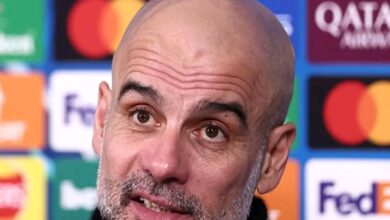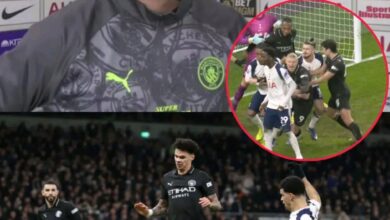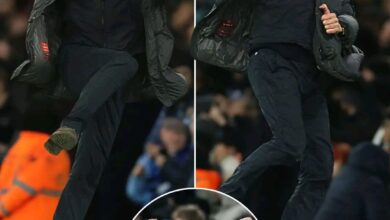He quickly deleted the post but the damage was done..

It was supposed to be a night of football, not drama. But whenever Real Madrid meet Liverpool, emotions always run high. This time, it wasn’t just about goals or tactics—it was about loyalty, friendship, and the fine line between respect and betrayal. The return of Trent Alexander-Arnold to Anfield was expected to cause a stir, but no one imagined the storm that would follow one simple Instagram post from his old teammate Curtis Jones.
Liverpool’s 1-0 win over Real Madrid on that cold Champions League night had already given fans enough to celebrate. Alexis Mac Allister’s header in the second half sealed victory and avenged Liverpool’s previous defeats to Madrid. Yet, while fans roared in joy, the internet exploded for a different reason entirely. Curtis Jones—Liverpool’s homegrown midfielder and lifelong Red—had shared a picture on his Instagram story before kick-off. It showed him laughing and chatting with Trent Alexander-Arnold, his childhood friend who had controversially joined Real Madrid earlier that year.
The post didn’t last long. Within hours, it vanished. But by then, the damage was done.
To understand why that single picture sparked such fury, one has to go back to May 2025. Trent Alexander-Arnold, the boy who grew up in West Derby and lived every Liverpool fan’s dream, shocked the football world by signing for Real Madrid. His contract with Liverpool was due to expire at the end of June, and rather than renew it, he accepted a £10 million move to Spain. For many Liverpool fans, it felt like betrayal. Trent wasn’t just a player—he was a symbol, a local hero who rose from the academy to become a Champions League and Premier League winner. Seeing him in the white shirt of Real Madrid felt like losing a piece of Anfield itself.
So when the Champions League fixtures brought Real Madrid back to Anfield, everyone knew it would be emotional. Some fans wanted to cheer him; others wanted to boo. But what no one expected was for one of Liverpool’s own—Curtis Jones—to openly post a friendly picture with Trent hours before kickoff.
The reaction online was brutal. “Every time I start warming to him, he does something to piss me off,” one fan wrote on X (formerly Twitter). Another said, “This guy can never read the room, man.” Some even called it disrespectful, claiming Jones had forgotten how much the fans were still hurt by Trent’s departure. For supporters who saw Alexander-Arnold’s exit as betrayal, the picture felt like salt in an open wound.
Curtis Jones probably meant no harm. He and Trent had grown up together at Liverpool’s academy, sharing the same dreams, bus rides, and youth matches. They had seen each other become professionals, travel the world, and win trophies together. To them, it was likely just a reunion of friends. But in football, timing is everything. Posting that image before such a charged fixture was bound to be misunderstood.
Within hours, as criticism piled up, Jones quietly deleted the post from his story. He didn’t release a statement, didn’t reply to any comments—just removed it. But once something hits the internet, it never truly disappears. Screenshots had already spread, and the image became the talking point of the night alongside the match result.
During the game, the atmosphere at Anfield was electric. Every time Trent touched the ball, a mixture of boos and whistles filled the stadium. Some fans raised banners reading “Once a Red, Always a Red—Unless You Leave.” It was clear that forgiveness would take time. Still, Trent kept his composure. He played with focus and grace, though every now and then, the camera caught his eyes glancing toward the Kop, almost as if searching for something familiar—something he once called home.
Meanwhile, Curtis Jones played with his usual energy but looked less animated than usual. Some speculated that the backlash had affected him mentally. He had to balance the emotional weight of playing against his friend while trying to prove to the fans that his loyalty to Liverpool remained unshaken.
The moment of the night came in the 61st minute when Alexis Mac Allister rose above everyone to score the winning goal. The stadium erupted, and Liverpool’s bench exploded in celebration. But then came another controversial twist. As Mac Allister ran toward the Real Madrid bench, cameras caught him making a strange hand gesture—two fingers pointing down with one finger placed across them. Many fans immediately noticed it was eerily similar to one of Trent’s old celebration poses.
Social media went wild again. “Was Mac Allister mocking Trent?” one fan tweeted. “That’s cold if true.” Others, however, suggested it was a tribute to his young daughter, Alaia. The truth remains unclear, but the image of him celebrating that way right in front of the Madrid bench only added more drama to an already fiery night.
After the final whistle, Liverpool players celebrated passionately. The victory meant more than just three points—it was redemption, pride restored after years of heartbreak at Madrid’s hands. Yet behind the smiles, a shadow lingered. Reporters tried to ask Curtis Jones about his deleted post, but he avoided the mixed zone. Liverpool’s media team declined to comment, clearly wanting to cool things down before the story grew any bigger.
Inside the dressing room, however, teammates reportedly teased Jones lightly about it. “Next time, maybe post it after the match,” one joked, according to whispers from the dressing room. The midfielder smiled awkwardly but didn’t say much. He knew he had made a mistake—not in caring about his friend, but in how it appeared to the fans.
For Trent, the night was a reminder of how emotional football can be. Walking onto the Anfield pitch again, he was met with mixed reactions—cheers from some, boos from others. He later told Spanish media that he “expected the reception” and that it “came from love and passion.” But deep down, it must have hurt. Anfield was his home for nearly two decades. The stands that once sang his name now viewed him as the enemy.
Curtis Jones’ deleted post might have been innocent, but it revealed how fragile the relationship between fans and players can be. Supporters see the badge as sacred, something beyond friendship or personal emotion. For them, football loyalty is everything. But for players—especially those who grew up together—it’s not that simple. Bonds built in youth academies and dressing rooms don’t just disappear because of a transfer.
Still, for Liverpool fans, timing mattered. The wounds from Trent’s departure were still fresh. Many felt he had left too soon, that he owed the club more years. Watching him in Real Madrid white, defending against his old teammates, was strange. Seeing a current Liverpool player post a happy picture with him before such a high-stakes game only deepened that pain.
In the following days, discussions continued online. Some fans defended Jones, reminding others that footballers are humans too. “He’s allowed to have friends,” one supporter wrote. “You can’t expect him to hate someone he grew up with.” Others, however, were less forgiving, saying Jones needed to “show more understanding of fan emotions.”
Even pundits got involved. Former Liverpool defender Jamie Carragher weighed in on *Sky Sports*, saying, “Curtis probably didn’t think much of it, but this is Liverpool vs Real Madrid—it’s not just another game. You’ve got to be aware of what that means to the fans.” His comment summed up the situation perfectly: not malicious, but careless.
Behind the headlines and online outrage, the human side of the story stands out. Curtis Jones and Trent Alexander-Arnold are more than just professionals; they’re two young men who spent their entire lives chasing the same dream in the same city. One chose a new path, and the other stayed. The game simply put them on opposite sides for ninety minutes.
Trent, for his part, handled the evening with quiet dignity. He applauded the crowd as he left the pitch, even as some fans jeered. Later that night, he posted a brief message on Instagram: “Anfield will always be special.” It was simple, emotional, and reminded everyone that football’s connections never really fade away.
As for Curtis Jones, he learned an important lesson. In an age where every post, every emoji, and every story can spark controversy, footballers have to navigate their lives carefully under the spotlight. A single image of friendship became a national talking point, overshadowing a hard-fought victory. But in the end, he removed it not because he regretted seeing his old friend, but because he understood that sometimes silence speaks louder than words.
Liverpool’s 1-0 victory over Real Madrid will be remembered for Mac Allister’s header, Trent’s emotional return, and the incredible atmosphere at Anfield. Yet, it will also be remembered for the off-field drama that showed how passionate and protective fans can be about their club. One post, one moment, and a stadium full of emotions—proof that football isn’t just about the game played on the pitch; it’s about the feelings it awakens in everyone watching.
As the dust settled and Liverpool looked ahead to their next fixture, both Trent and Curtis moved on quietly. The picture may be gone, but the story remains—an example of how football friendships and fan loyalty often clash in a world where every move is public and every emotion magnified.
And perhaps, deep down, even the angriest Liverpool fans would admit—seeing Trent back at Anfield, even in white, reminded them just how much he once meant to the club, and how football can break hearts even when it brings joy.















